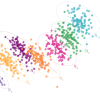A Geographical Perspective on Simpson's Paradox
DOI:
https://doi.org/10.5311/JOSIS.2023.26.212Keywords:
local models, global models, Simpson's paradox, process scale, multiscale geographically weighted regression, MGWRAbstract
The concept of scale is inherent to, and consequential for, the modeling of geographical processes. However, scale also causes huge problems because the results of many types of spatial analysis appear to be dependent on the scale of the units for which data are reported (measurement scale). Consequently, when the same spatial models are calibrated at different scales of aggregations, the results are often vastly different (the well-known Modifiable Areal Unit Problem or MAUP). With the advent of local models and the fundamental difference in their scale of application compared to global models, this issue is further exacerbated in unexpected ways. For example, a global model and local model calibrated using data measured at the same aggregation scale can also result in different and sometimes contradictory inferences (the classic Simpson's Paradox). Here we provide a geographical perspective on why and how contrasting inferences might result from the calibration of a local and global model using the same data. Further, we examine the viability of such an occurrence using a synthetic experiment and two empirical examples. Finally, we discuss how such a perspective might inform the analyst’s conundrum: when the respective inferences run counter to one another, do we believe the local or global model results?

Downloads
Published
Issue
Section
License
Copyright (c) 2023 Mehak Sachdeva, A. Stewart Fotheringham

This work is licensed under a Creative Commons Attribution 3.0 Unported License.
Articles in JOSIS are licensed under a Creative Commons Attribution 3.0 License.
